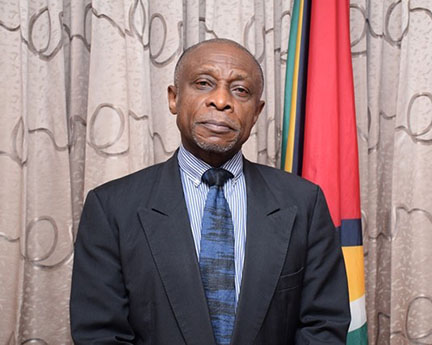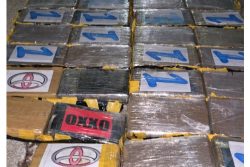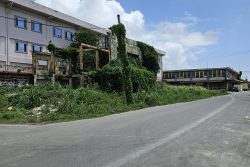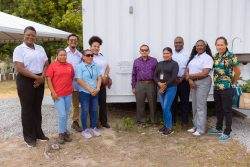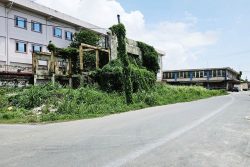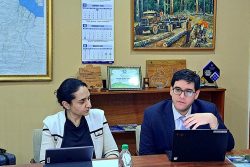Led by Sir Shridath Ramphal and a team of experienced overseas-based and local legal minds, Guyana is well on track to meeting the November 19th deadline for delivery of a memorial addressing the question of the jurisdiction of the International Court of Justice (ICJ) to hear the longstanding border controversy with Venezuela, Foreign Affairs Minister Carl Greenidge assured on Monday.
Aside from a United Kingdom (UK)-based law firm, Greenidge declined to identify other members of the country’s legal team.
In responding to a question from Stabroek News at a press conference held in the ministry’s main conference room, the minister said that the preparation of the memorial is in train. He added that the legal team is two-fold, with one part, which is headed by Sir Shridath, comprising overseas-based lawyers, and the other consisting of lawyers attached to the Ministry.
He stressed that the overseas-based lawyers bring a wealth of skills and experience to the table, having experience in the legal landscape of border controversy issues. He said they have previously worked at the level of the ICJ and have been lending support to and “guiding” Guyana.
Some of the local lawyers, he said, were recently recruited by the ministry. “I don’t want to give you any names at this point in time. You know, the Ministry of Foreign Affairs has a range of skills and a range of lawyers,” he said. With regards to the overseas-based lawyers, Greenidge told reporters that they come from three Chambers. He added that others lawyers possessing the needed skills could be hired depending on the issue at hand. “I don’t want to say much more than I have already,” he noted, while reminding that it is a known fact that Matrix, a United Kingdom-based firm, is among the three working with Sir Shridath. Greenidge explained that a Professor of Law who lectures at two prominent UK universities is attached to the firm.
“At the moment, leave it at that and names will be provided in due course,” he said when pressed for the identities of the other lawyers.
Following Venezuela’s rejection of proceedings at the ICJ, the World Court has said that written pleadings in the matter must first address the question of its jurisdiction.
In a press release posted on its website earlier this month, the ICJ, which is based in The Hague, Netherlands, said by an Order, dated 19th June, 2018, the Court fixed November 19th, 2018 and April 18th, 2019, as the respective time-limits for the entering of a memorial by Guyana and a counter-memorial by Venezuela.
Greenidge, in a prepared statement, said that it goes without saying that the issue of territorial integrity has absorbed a great deal of the ministry’s energies. He noted that citizens will be aware of the discussions with the United Nations (UN) Secretary-General and his Personal Representative in 2017.
Following a request by Guyana for a juridical settlement, former UN Secretary General Ban Ki-moon on December 15th, 2016, had given the good offices process between the two countries one additional year – 2017 – for talks at settling the controversy and if there was no substantial progress the matter would then be sent to the ICJ. This did not happen and as a result the United Nations Secretary-General António Guterres on January 30th this year recommended that the Guyana/Venezuela border controversy be referred to the ICJ.
According to Greenidge, as a result of the Secretary-General’s decision, Guyana has laid its case on the Arbitral Award of 1899. The Court has decided that the written pleadings of the Party/ies shall first be addressed to the question of the jurisdiction of the Court.
He said that it is in this context that the Ministry of Foreign Affairs in association with the Ministry of Education has produced two Public Service Announcements (PSAs) aimed at increasing public awareness of the ongoing Guyana-Venezuela controversy. “This is part of a more extensive set of interventions,” he noted.
After decades of the Good Offices process under UN auspices failing to resolve the border controversy, Guyana on March 29th, 2018, filed an application with the ICJ requesting that it confirm the legal validity and binding effect of the 1899 arbitral award settling the boundaries between British Guiana and Venezuela.
As a result of Guyana’s application on March 29th, the ICJ in early June announced that it would receive the Representatives of Venezuela and of Guyana on June 18th, 2018, in order to know the points of view of the parties regarding procedural issues in Georgetown’s move for a juridical settlement of the controversy.
It was at this meeting that Venezuela advised the ICJ that it would not be taking part in the process and did not recognise the court’s jurisdiction.
In its press release, the ICJ said that pursuant to Article 31 of the Rules of Court, its President, Judge Abdulqawi Ahmed Yusuf, met with representatives of the Parties, on 18 June 2018.
At this meeting, it said that Greenidge, the Agent of Guyana, indicated that his Government wished to have at its disposal a period of nine months for the preparation of its Memorial. Guyana has, however, been given six months.
Delcy Rodríguez Gómez, Vice-President of Venezuela, stated, according to the press release, that her government considered that the Court manifestly lacked jurisdiction and that it had decided not to take part in the proceedings. She handed to the President of the Court a letter, dated 18th June, 2018, from President of Venezuela Nicolás Maduro, in which he pointed out, in particular, that there was no basis for the jurisdiction of the Court and that Venezuela would not participate in the proceedings.
In response to the statement of the Vice-President of Venezuela, the release said that the representatives of Guyana reiterated that their government wished to proceed with the case.
In its Order of June 19th, the release said that the Court pointed out that in the circumstances of the case, it must first settle the question of its jurisdiction and that “this question should accordingly be separately determined before any proceedings on the merits” of the matter filed by Guyana.
The release said that the Order notes that “the possibility for Venezuela of availing itself of its procedural rights as a Party to the case is preserved.”
